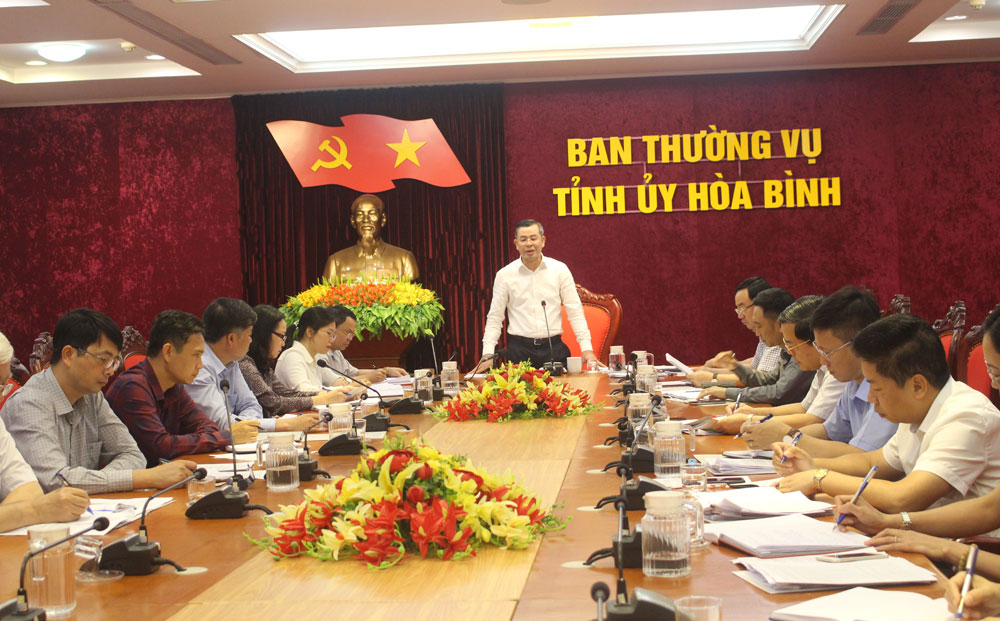
(HBO) – Member of the Party Central Committee and Secretary of the provincial Party Committee Ngo Van Tuan held a working session with the provincial financial sector on April 14 to review State budget performance and public investment disbursement in the first quarter as well as launch key tasks for the remaining months of this year. Attending the event were Vice Chairman of the provincial People’s Committee Quach Tat Liem and leaders of departments and agencies.
 Member of the Party Central
Committee and Secretary of the provincial Party Committee Ngo Van Tuan speaks at
the working session.
Member of the Party Central
Committee and Secretary of the provincial Party Committee Ngo Van Tuan speaks at
the working session.
The provincial Finance Department reported
that State budget collection reached over 1 trillion VND in the first quarter,
or 23 percent of the estimate set by the Government. Of which, 897.4 billion
VND was domestic collection, equivalent to 19 percent of the target set in the
Resolution of the provincial People’s Council, up 26 percent year-on-year. Collection
from exports hit 103.4 billion VND, or 171 percent of the figure in the same
period last year.
The province disbursed 55.9 billion VND, or
14 percent of the plan by the provincial People’s Committee.
At the working session, delegates shared
the view that State budget collection showed progress year-on-year. They
pointed out difficulties and challenges as well as offered suggestions to
improve the efficiency of the effort, accelerate disbursement progress and tax
debt collection.
Concluding the event, Tuan hailed the
sector for effectively managing and using resources for socio-economic
development.
Basically agreeing with the sector’s
measures, Tuan asked the sector to materialise the Resolution of the 17thprovincial Party Congress via action plans and programmes, improve the
efficiency of giving advice to the province to perform State budget task, with
special attention given to building a contingent of responsible and capable finance
officers to fulfill assigned missions. He asked the sector to partner with
relevant units to accomplish the budget collection task, remove difficulties in
production and business, and improve the investment environment, thus creating
a sustainable source of income for the State budget./.
The Standing Board of the Hoa Binh provincial Party Committee has agreed in principle on a proposal by the Standing Board of the Party Committee of Hoa Binh city to gather feedback on the city’s 1:2000 zoning plan, which forms part of its broader urban development strategy.
Hoa Binh province has made notable progress in public administration reform and digital government development, with the satisfaction index among citizens and businesses reaching over 84%, according to recent government evaluations.
Thanks to great efforts by local authorities in recent times, the governance and public administration performance of Mai Chau district has been significantly improved.
In the afternoon of June 6, the Party Committee, the People's Council, the People's Committee and the Fatherland Front of Lac Son district solemnly held a meeting to celebrate the 139th anniversary of the district's founding (1886–2025) and the 79th anniversary of the establishment of the district's Party Committee (1946–2025). There was the attendance of Mr. Bui Van Thang, the Vice Chairman of the Provincial People's Council; Mr. Quach Tat Liem, the Vice Chairman of the Provincial People's Committee; Ms. Dang Bich Ngoc, the Deputy Head of the National Assembly Delegation of the province; as well as the former leaders of the province and district through various periods, who are the natives of the district.
Implementing the Politburo’s Resolution No. 57-NQ/TW on breakthroughs in science – technology, innovation, and digital transformation is a golden opportunity for the northern mountainous province of Hoa Binh to renew growth model, improve competitive edge and shorten digital gap.
Resolution 57-NQ/TW, issued by the Politburo on December 22, 2024, identifies sci-tech, innovation, and digital transformation as strategic breakthroughs to build a developed and prosperous nation. In Hoa Binh province, this spirit is not just a slogan, it’s being put into action through concrete initiatives that form a "new development triangle”: digital citizenship, digital economy, and digital administration.



 Member of the Party Central
Committee and Secretary of the provincial Party Committee Ngo Van Tuan speaks at
the working session.
Member of the Party Central
Committee and Secretary of the provincial Party Committee Ngo Van Tuan speaks at
the working session.